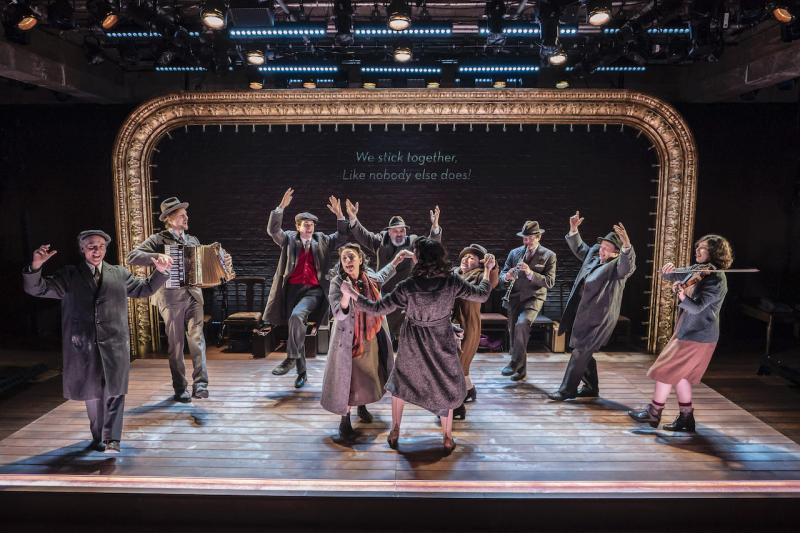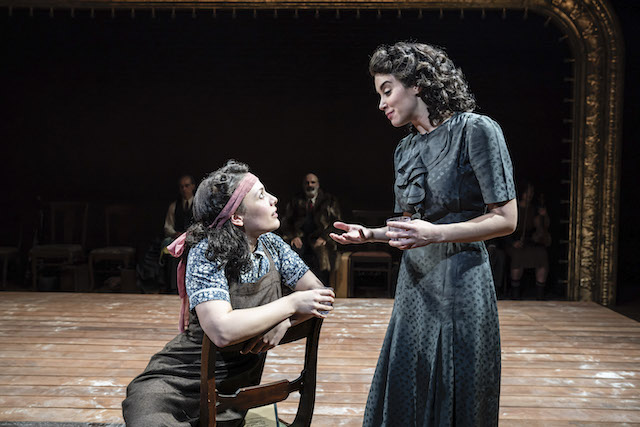Indecent, Menier Chocolate Factory review - cabaret-style depiction of a rapidly changing world | reviews, news & interviews
Indecent, Menier Chocolate Factory review - cabaret-style depiction of a rapidly changing world
Indecent, Menier Chocolate Factory review - cabaret-style depiction of a rapidly changing world
An intriguing if flawed evening, boosted by ebullient ensemble work

Indecent is a play wrapped inside a news story about stigma. Playwright Paula Vogel was at Cornell University when she stumbled on a “yellowing copy of an out-of-print translation” of Sholem Asch’s God of Vengeance.
For Vogel, who came out at university, the discovery of God of Vengeance – with its first depiction of a kiss between women on the American stage – was a revelation. Director Rebecca Taichman’s own encounter with Asch’s script happened as a result of researching the 1923 obscenity trial. This cabaret-style production – with its inevitable resonances of Weimar – is Vogel and Taichman’s response; a tragi-comic drama about the theatre troupe that perfomed God of Vengeance, as they are forced to chart the treacherous currents of a rapidly changing world. It covers a similar era to Leopoldstadt, but is a very different exploration of Jewishness, though as the influence of the far right continues to manifest itself in modern politics the themes remain all too resonant.
The production is delayed from last year because of Covid, so it’s perhaps no surprise that the evening opens with the energy of a coiled spring. We view the cast and musicians as if from backstage, shaking the dust off as they perform klezmer-style songs while the MC introduces each of them with the names of the original Yiddish performers. Quickly the action shifts to Warsaw in 1906, where Molly Osborne’s Madje Asch (Sholem’s wife) is rapturously reading God of Vengeance aloud to her husband (Joseph Timms). She perceives instantly that it will be a hit in Europe’s sophisticated and sexually adventurous intellectual circles.
For Vogel part of the fascination of this important landmark in queer theatre was that it had been written by a young married man. Yet while Asch clearly sees his play as an honest attempt to depict Jewish life in all its vivid variety, when he takes it to the Warsaw salon of his writing idol, I L Peretz (played by Peter Polycarpou), the reaction is that he should burn it. Vogel frames this scene as a wry comedy, in which the gathering of middle-aged and elderly men attempt to take on the characters of the young women both in the brothel and the lesbian love scene. Finbar Lynch stands out here for his comic and empathetic performance as Lemml, the uneducated outsider who is so moved by the work that he ignores the outrage and joins Asch’s company.
 There is a lot of material to cover in this story, as Asch takes the script to Berlin where it is hailed as a sensation, then on a whirlwind tour to cities including St Petersburg, Bratislava and Constantinople. Each destination is identified through surtitles on the backdrop, while the cast shift round the stage, repeatedly performing the final dramatic lines to increasing hilarity. At the emotional heart of the play is the moment when the prostitute and the virginal brothel-owner’s daughter kiss in the rain, compared by both Vogel and Taichman to the balcony scene in Romeo and Juliet. Like all the cast, Molly Osborne and Alexandra Silber (pictured above) play a range of characters in the production, but as the lovers they manage to convey a genuine heartfelt connection.
There is a lot of material to cover in this story, as Asch takes the script to Berlin where it is hailed as a sensation, then on a whirlwind tour to cities including St Petersburg, Bratislava and Constantinople. Each destination is identified through surtitles on the backdrop, while the cast shift round the stage, repeatedly performing the final dramatic lines to increasing hilarity. At the emotional heart of the play is the moment when the prostitute and the virginal brothel-owner’s daughter kiss in the rain, compared by both Vogel and Taichman to the balcony scene in Romeo and Juliet. Like all the cast, Molly Osborne and Alexandra Silber (pictured above) play a range of characters in the production, but as the lovers they manage to convey a genuine heartfelt connection.
In a story of this complexity, it’s often difficult to know what to include and what to leave out, and it’s not always clear the right decisions have been made here. Given the comparisons made with Shakespeare's tragedy, we know quite a lot more about his characters, which in turn provides a stronger sense of what’s at stake both personally and politically. It would be good too to experience in more depth the way Asch’s relationship with the play evolves as he matures and becomes more politically aware - not least when he’s forced to censor it for its fateful transition to Broadway.
Such concerns aside, this production – which played to rave reviews with a different cast on Broadway – tells a fascinating story aided by dynamic and ebullient ensemble work. Visually, there are moments that hit you in the solar plexus, not least when the entire company is forced to put on yellow stars for identification. Despite the increasingly sinister political backdrop, this is a moving and uplifting evening, marked in particular by charismatic performances from Timms, Lynch and Silber. It’s good too to see the Menier tackling this kind of material, even though it will need substantial tweaks if – like so many Menier productions – it is to transfer to the West End.
rating
Explore topics
Share this article
The future of Arts Journalism
You can stop theartsdesk.com closing!
We urgently need financing to survive. Our fundraising drive has thus far raised £49,000 but we need to reach £100,000 or we will be forced to close. Please contribute here: https://gofund.me/c3f6033d
And if you can forward this information to anyone who might assist, we’d be grateful.

Subscribe to theartsdesk.com
Thank you for continuing to read our work on theartsdesk.com. For unlimited access to every article in its entirety, including our archive of more than 15,000 pieces, we're asking for £5 per month or £40 per year. We feel it's a very good deal, and hope you do too.
To take a subscription now simply click here.
And if you're looking for that extra gift for a friend or family member, why not treat them to a theartsdesk.com gift subscription?
more Theatre
 Hamlet, National Theatre review - turning tragedy to comedy is no joke
Hiran Abeyeskera’s childlike prince falls flat in a mixed production
Hamlet, National Theatre review - turning tragedy to comedy is no joke
Hiran Abeyeskera’s childlike prince falls flat in a mixed production
 Rohtko, Barbican review - postmodern meditation on fake and authentic art is less than the sum of its parts
Łukasz Twarkowski's production dazzles without illuminating
Rohtko, Barbican review - postmodern meditation on fake and authentic art is less than the sum of its parts
Łukasz Twarkowski's production dazzles without illuminating
 Lee, Park Theatre review - Lee Krasner looks back on her life as an artist
Informative and interesting, the play's format limits its potential
Lee, Park Theatre review - Lee Krasner looks back on her life as an artist
Informative and interesting, the play's format limits its potential
 Measure for Measure, RSC, Stratford review - 'problem play' has no problem with relevance
Shakespeare, in this adaptation, is at his most perceptive
Measure for Measure, RSC, Stratford review - 'problem play' has no problem with relevance
Shakespeare, in this adaptation, is at his most perceptive
 The Importance of Being Earnest, Noël Coward Theatre review - dazzling and delightful queer fest
West End transfer of National Theatre hit stars Stephen Fry and Olly Alexander
The Importance of Being Earnest, Noël Coward Theatre review - dazzling and delightful queer fest
West End transfer of National Theatre hit stars Stephen Fry and Olly Alexander
 Get Down Tonight, Charing Cross Theatre review - glitz and hits from the 70s
If you love the songs of KC and the Sunshine Band, Please Do Go!
Get Down Tonight, Charing Cross Theatre review - glitz and hits from the 70s
If you love the songs of KC and the Sunshine Band, Please Do Go!
 Punch, Apollo Theatre review - powerful play about the strength of redemption
James Graham's play transfixes the audience at every stage
Punch, Apollo Theatre review - powerful play about the strength of redemption
James Graham's play transfixes the audience at every stage
 The Billionaire Inside Your Head, Hampstead Theatre review - a map of a man with OCD
Will Lord's promising debut burdens a fine cast with too much dialogue
The Billionaire Inside Your Head, Hampstead Theatre review - a map of a man with OCD
Will Lord's promising debut burdens a fine cast with too much dialogue
 50 First Dates: The Musical, The Other Palace review - romcom turned musical
Date movie about repeating dates inspires date musical
50 First Dates: The Musical, The Other Palace review - romcom turned musical
Date movie about repeating dates inspires date musical
 Bacchae, National Theatre review - cheeky, uneven version of Euripides' tragedy
Indhu Rubasingham's tenure gets off to a bold, comic start
Bacchae, National Theatre review - cheeky, uneven version of Euripides' tragedy
Indhu Rubasingham's tenure gets off to a bold, comic start

Add comment